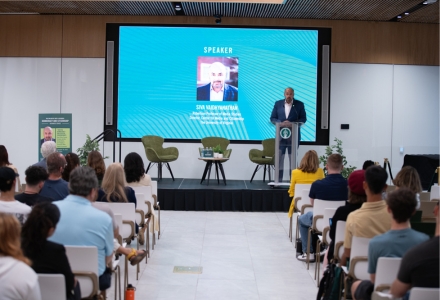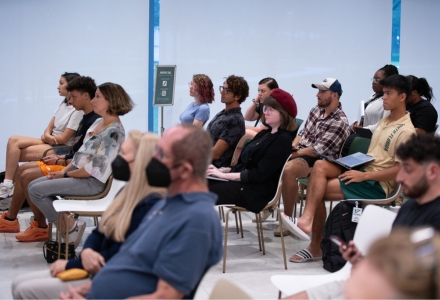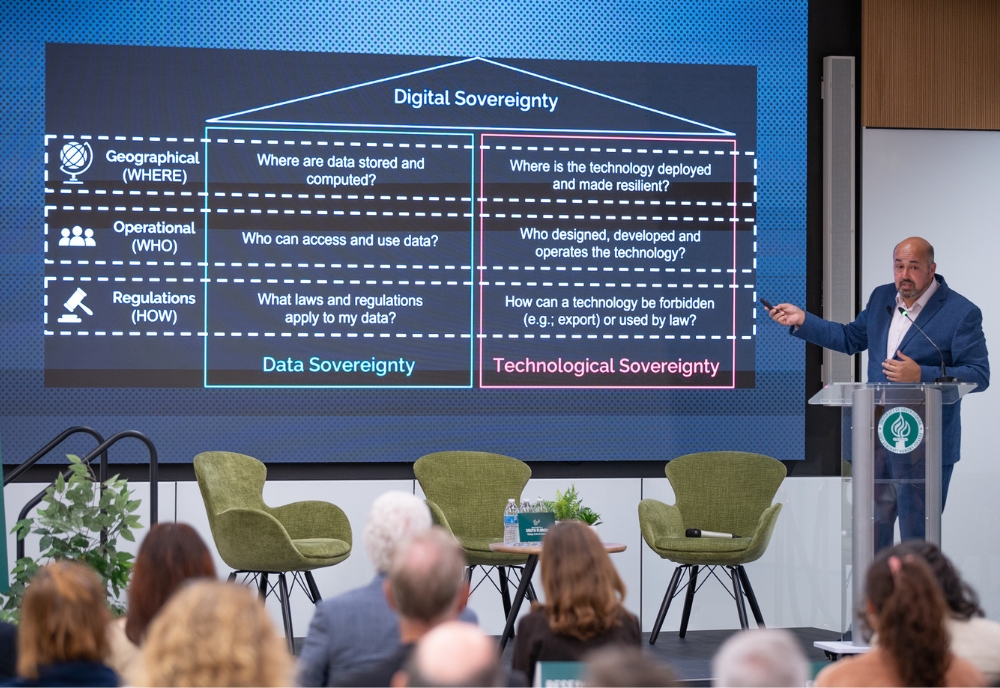
Siva Vaidhyanathan is a columnist for The Guardian and has written for many other periodicals. He’s also authored numerous books, including his most recent, “Antisocial Media: How Facebook Disconnects Us and Undermines Democracy.” (Photo by Corey Lepak)
The USF College of Art and Sciences (CAS) and Judy Genshaft Honors College welcomed Siva Vaidhyanathan, the Robertson Professor of Media Studies and director of the Center for Media and Citizenship at the University of Virginia, for the Democracy and Citizenship Speakers Series.
The discussion, “Digital Democracy and Digital Sovereignty: How China, Russia, Europe, and the United States are Forging a Fractured, New, Digital Ecosystem,” was held on Sept. 28 at the Judy Genshaft Honors College.
The conversation focused on how technological advances and the internet grew under the assumption of enlightening the world, but that it can also greatly influence democracy and safety.
Vaidhyanathan shared how “digital sovereignty,” the ways that a nation creates and enforces its own sense of what should be allowed and watched on digital networks, can also lead to methods of oppression.
“Fundamentally, democracy is an anti-violence system. It is the best thing we've come up with to settle differences without hitting and shooting each other,” he said. “That's how crucial democracy is. It's what lets us live among differently-minded people—competing for resources—without resorting to violence.”
Democracy, he said, works on the premise that each individual has a voice.
“How can we limit the influence of the wealthy and powerful so that they don't corrupt democracy from their positions of power to have it serve their own narrow interests? How can we ensure that we the people are getting access to information unfettered by the interest of the powerful? How can we the people make sure that we can speak freely, be heard, talk to each other, and argue it out without, again, it all being twisted or filtered by the interest of the powerful? That’s where most of the efforts of media comes from,” he said.
 Kaylor Smith, student, (left), and Dr. Joshua Scacco, associate professor in the Department
of Communication, (right), lead a Q & A session with Dr. Vaidhyanathan. (Photo by
Corey Lepak)
Kaylor Smith, student, (left), and Dr. Joshua Scacco, associate professor in the Department
of Communication, (right), lead a Q & A session with Dr. Vaidhyanathan. (Photo by
Corey Lepak)
 Attendance at this Democracy and Citizenship Series fulfilled an opportunity for rigorous
debate as mandated by the State of Florida Civics Literacy graduation requirement. It
was also the first of the series to be held at the newly opened Judy Genshaft Honors
College. (Photo by Corey Lepak)
Attendance at this Democracy and Citizenship Series fulfilled an opportunity for rigorous
debate as mandated by the State of Florida Civics Literacy graduation requirement. It
was also the first of the series to be held at the newly opened Judy Genshaft Honors
College. (Photo by Corey Lepak)
However, he explained how the commercialization of mass media—which began at the dawn of the first newspapers—has impacted democracy throughout history and still impacts it today.
This concentration of digital power can have disastrous effects on democratic practices which undermine democracy and can lead to violence, he explained, as he provided an overview leading up to the invasion of Ukraine.
“This is actually a super urgent problem. And, again, we see it in its most acute and visible form in the defense of democracy in Ukraine, that is just where the story is most clear. It’s everywhere. We have to do what we can to limit the power of extremely powerful people,” he said. “We need to make sure the power is distributed fairly in a way that actually allows for the flourishing of democracy because that is the only way we get to the flourishing of humanity.”
Learn more about attending future Democracy and Citizenship Series lectures.
